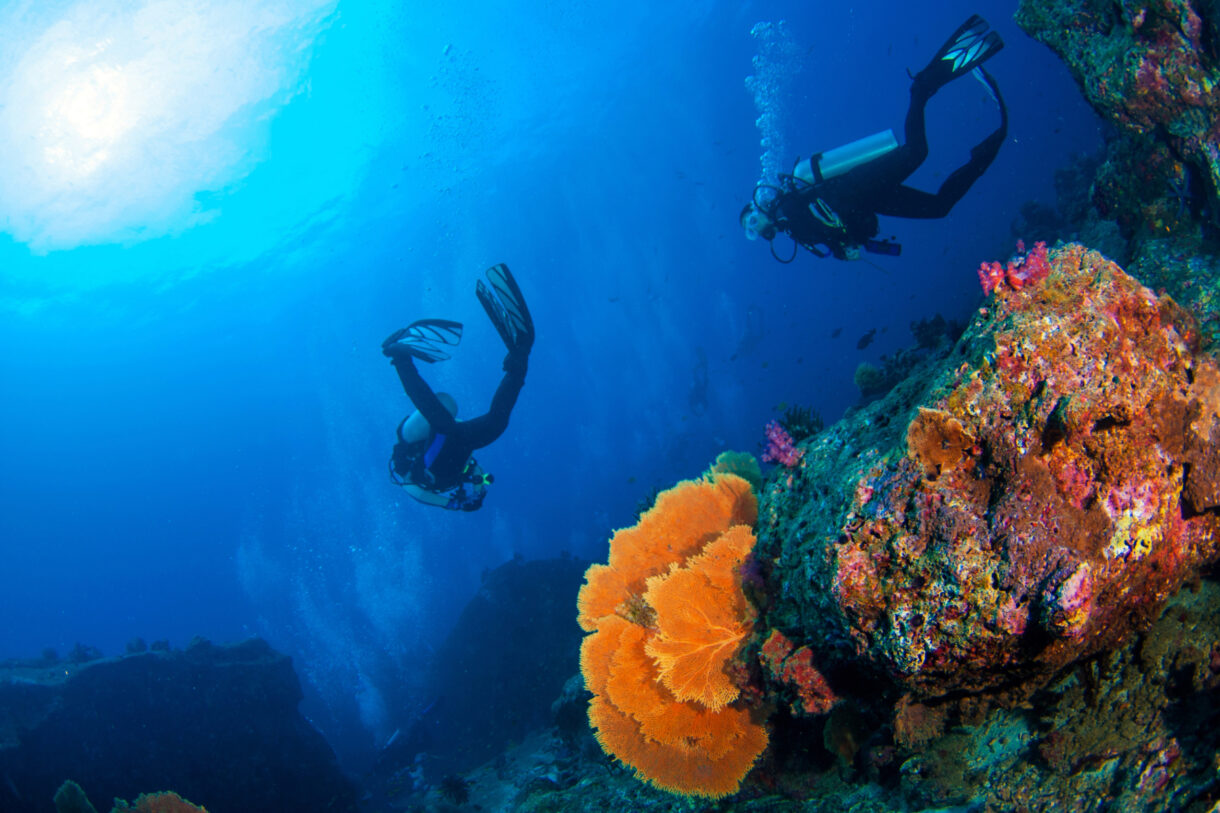
Getting your SCUBA diving Open Water Certification on a budget: the ULTIMATE guide for savvy travellers
It’s definitely not a budget hobby, but diving isn’t as expensive as you might think. If you want to get started on what is (in my opinion) the greatest hobby ever, here’s everything you need to know to get your open water certification on a budget!
Do you like adventurous activities? How about spotting rare wildlife? Does budget travelling leave you frazzled and in need of a breather? Well, I’ve got the solution. Introducing… scuba diving!
Ok, I’m joking. I know you’ve probably heard of diving before, most people have. But if you like adventure activities and you’re looking for a new hobby to help you relax and escape from the hustle and bustle of your travels, scuba diving could be the activity for you.
Diving has all the magic of swimming and snorkelling but with so much more freedom to explore the underwater world. Usually accessible only through nature documentaries, diving is the closest feeling you can get to being an astronaut: weightless and floating through space.
Getting scuba certified might seem daunting, but it’s actually not as expensive as you’d imagine. This post will cover everything you need to get your open water certification on a budget. We’ll discuss the cheapest places to dive, what to expect, how to find a good budget-friendly dive centre, and everything you need to pack to get started with your open water course (spoiler alert, it’s two items).
Ready? Let’s dive in!
In a rush? Jump to the relevant section here!
- Is SCUBA diving a budget activity?
- What is an open water diving certification?
- How do I get open water certified?
- PADI vs SSI SCUBA certificaitons: which one is best?
- Which country is cheapest to get started with SCUBA diving?
- Can I learn to SCUBA dive at home on a budget?
- How to choose a budget dive company?
- Top tips to keep your costs down during your diving course(s)
- Advanced Open Water: is it worth it, and do you need it?
- What to bring on your dives?
- Sustainable diving: best practices
- FAQs
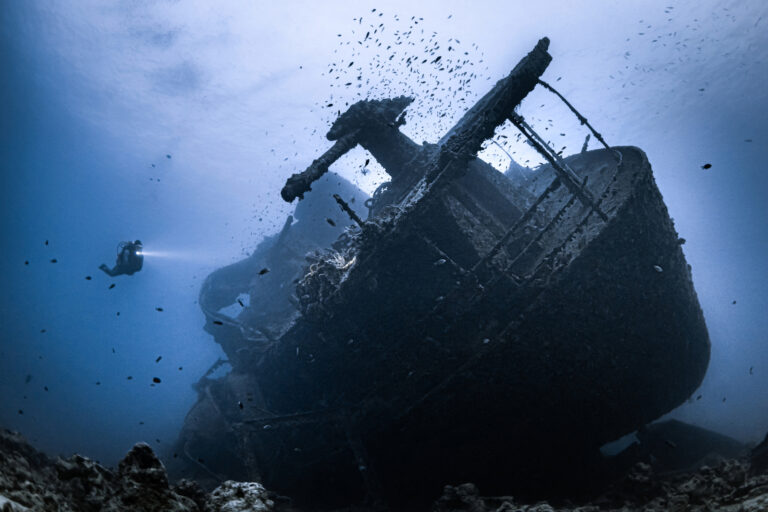
No, this isn’t AI generated! This is the Thistlegorm Shipwreck in Egypt
IS SCUBA DIVING A BUDGET ACTIVITY?
Absolutely not.
Whilst this may be a guide to getting your Open Water Certification on a budget, it’s important to know that diving is definitely not a budget activity. However, it is a lot of fun, and we think it’s worth splashing out on occasionally. So as frugal travellers, is there a way to get open water certified on a budget, safely and cheaply?
Yes! Whilst learning to dive will cost you a chunk of money, there are many places to get your Open Water Certification on a budget so you can get started on your underwater adventure.
There are a few things to consider when looking for a place to get your Open Water Scuba Diving Certification on a budget. These are:
- The type of certification. There are two agencies that offer internationally-recognised Open Water Scuba Diving Certifications. These are PADI and SSI. We’ll compare the differences between the two.
- Location. Underwater visibility and the wildlife you’ll see varies around the world. We’ll share our favourite budget-friendly locations for an amazing first-dive experience!
- Safety. We’ll share top tips on what to look out for when choosing a dive centre to ensure your safety.
- Cost. Some locations are cheaper than others to get your Open Water diving certification on a budget. We’ll share our favourite budget-friendly locations to get Open Water certified.
WHAT IS AN OPEN WATER CERTIFICATION?
The Open Water Certification, also called a ‘diver’s license’, is the first scuba certification level. You have to take this course before you’re allowed to dive without an instructor.
Diving can be dangerous if you don’t know what you’re doing. Getting proper instruction and practice through an Open Water Certification means you’ll be able to dive safely and get yourself out of sticky situations. Once you’re qualified, you’ll be able to dive to 18 metres (~60 ft) deep without an instructor. You don’t want to be doing that without basic training!
Holding this certification allows you to:
- Dive anywhere in the world up to 18 metres (~60 feet) in depth
- Rent diving equipment
- Book boat dives
- Dive on your own with a buddy up to 18m/60ft depth (as long as your buddy is certified too!)
- Take speciality diving courses, such as underwater photography
The Open Water Certification covers the basic skills you need to dive safely. You’ll learn:
- Diving theory, usually in a ‘classroom’ on land
- How to dive safely
- Scuba diving hand signals
- How to master your buoyancy (this helps you to minimise your air consumption and dive for longer)
- Proper swimming position to avoid damaging corals
- Skills to help get yourself out of a dangerous situation, such as taking off and replacing your dive mask and buoyancy control device (BCD)
HOW DO I GET OPEN WATER CERTIFIED?
The only way to get your Open Water Certification is by taking an open water dive course. This is a short course that lasts three to four days.
There are three parts to the course:
- Theory. There are a few classroom sessions and academic coursework sections you have to complete before you’re allowed to dive. These cover diving theory, safety, how to use your diving equipment, and rules to follow when you dive. Each section has questions and quizzes at the end, but don’t worry, you can’t really ‘fail’ it.
- Practice. Once you finish the theoretical training, you’ll be able to put the skills you’ve read about into practice! You’ll start with a couple of dives in a controlled environment, usually a pool or a shallow, sheltered sectiio of the ocean (up to ~2m/6ft in depth).
- Diving. Finally, you’ll get to do your open water skills across several ‘real dives’ in the ocean or a lake. This is the best part. You get to explore the new underwater world with your instructor.
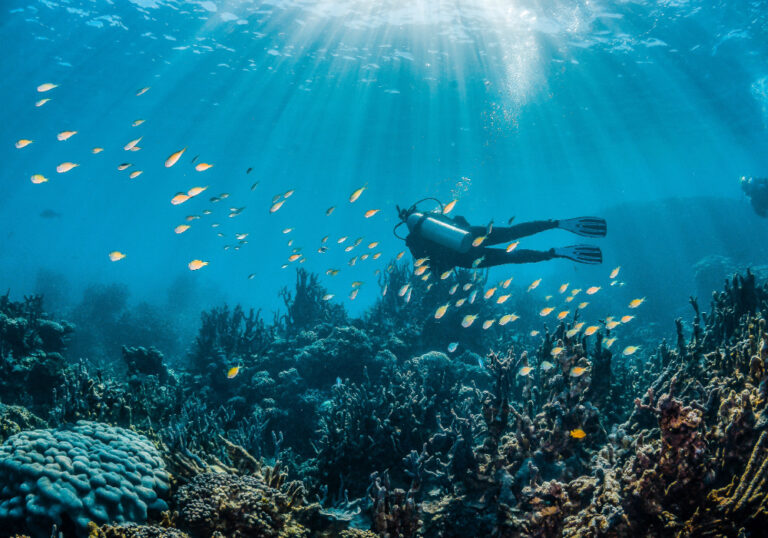
Diving in Utila, Honduras
PADI VS SSI VS NAUI SCUBA CERTIFICATIONS: WHICH TO PICK?
You can learn to dive with thousands of dive centres around the world. But there are only three agencies that offer internationally recognised scuba diving courses and certifications. These are PADI (Professional Association of Diving Instructors), SSI (Scuba Schools International) and NAUI (National Association of Underwater Instructors).
Any dive centre that offers certifications will usually offer courses from one of these agencies.
So, what’s the difference? Well, NAUI, PADI and SSI are internationally recognised. They are also pretty interchangeable in what their courses teach. We found that there tend to be more PADI-certifying centres worldwide than SSI. However, SSI is cheaper than PADI, because you ‘rent’ your training materials instead of purchasing them. And NAUI tends to be a little cheaper than both, because they are a non-profit organisation.
Note: PADI and SSI both offer a hybrid online/in-person course if you’d prefer to do the coursework at home. SSI even offers online coursework for FREE that you can do before you set off to your destination. This can help keep costs down!
PADI VS SSI VS NAUI: WHAT DID WE CHOOSE?
We didn’t do too much research before signing up for our Open Water Certification. In fact, all my ‘research’ went out the the window the minute I embraced the flow of Central America.
Going off other travellers’ recommendations, we got our SSI certification in Utila, Honduras, with Captain Morgan’s Dive Centre.
It’s important to note that you can switch between NAUI, PADI and SSI throughout your diving journey – at least until you commit to your Dive Master or Instructor course (which, if you’re reading this post, is probably a long way off).
Why didn’t we consider NAUI? Well, mostly because we just didn’t come across any NAUI training centres on our travels! I tend not to overcomplicate things and honestly, didn’t do too much research into any of this before we dived into getting certified.
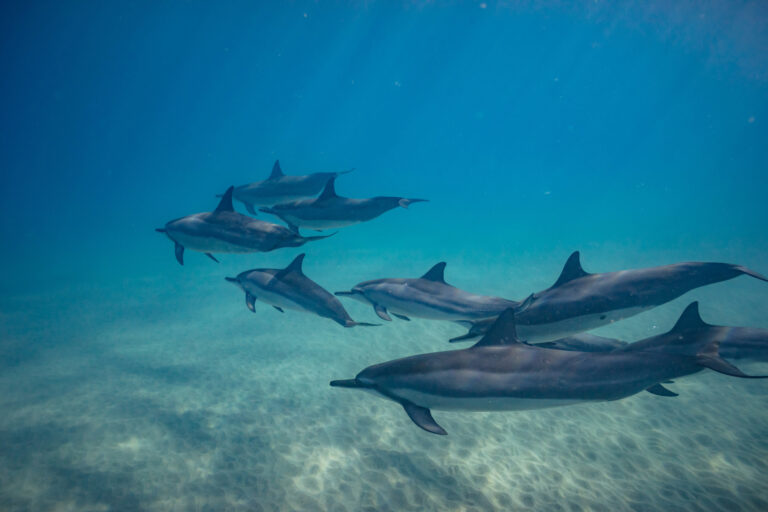
Wild dolphins in Egypt
WHICH COUNTRY IS BEST TO GET MY OPEN WATER CERTIFICATION ON A BUDGET?
There are so many places to get open water certified around the world. If you’re travelling whilst reading this, your ‘cheapest’ option is probably the closest one (factoring in the cost of getting there).
If you’re in Southeast Asia, you may wish to add Thailand, Indonesia, or the Philippines to your itinerary. All are excellent places to discover diving on a budget. Egypt is a great place to do your open water certification if you’re travelling around Europe or Africa. And anyone visiting the Americas should head to Mexico, Honduras, or Nicaragua for a budget-friendly Open Water Certification.
Some of the cheapest places in the world to learn to dive are:
- Koh Tao, Thailand (~$250- $450 USD)
- Utila, Honduras (~$300 USD). This is where we got our SSI open-water certification. It was cheap and there was enough coral and wildlife to keep it interesting.
- Sharm El-Sheikh or Dahab, Egypt ($250-$350 USD). We’ve also dived here and there was a lot to see, including some underwater sculptures that are being used for coral restoration.
- Amed, Indonesia ($250-$400 USD)
- Cozumel, Mexico ($350-$500 USD). We did our PADI Advanced Certification here. It’s not as cheap as other places in Central America, but competition keeps the prices as low as possible.
Why do I recommend these places specifically? Well, all of these dive destinations are beautiful, with plenty to see above and below the water. They’re also warm, meaning your introduction to diving will be much more enjoyable. And, they’re affordable budget-friendly countries to travel in, keeping the costs of food and accommodation low whilst you dive.
CAN I GET MY OPEN WATER CERTIFICATION ON A BUDGET AT HOME?
If you have access to a body of water, there’s probably somewhere near your home city that’ll teach you to dive. And I know I said that the nearest place to learn to dive is probably the closest, once you account for other travel costs…
…But if you’re reading this at home, I still recommend that you choose somewhere beautiful and warm and make a holiday out of getting your budget Open Water Certification.
Why, you ask? Well, yes you can probably find a diving school near your home that offers PADI or SSI qualifications. But unless you live somewhere tropical, you’ll likely be doing your dives in a pool (boring!) or a murky lake (cold with poor visibility!). Your home country probably lacks the diverse marine life that you’re excited to see whilst learning to scuba dive. You won’t fall in love with diving the way that you do when you’re somewhere beautiful.
Don’t believe us? We have first-hand experience of diving in both tropical paradises and in Scotland, our home country.
We did our dry suit diving course in Scotland, a prerequisite to dive between tectonic plates in Iceland’s Silfra Fissure. There was one practice session in a pool, which was barely deep enough, followed by two dives in Loch Long, which was murky with just a few starfish and crabs. If this had been our introduction to diving, I don’t think we’d have continued!
Plus, the costs of dive schools in places like the U.S. or Europe are much higher. For example, an open water course in Florida will set you back $550 USD. And the same course in our home city of Edinburgh currently costs £475 ($620 USD).
To put this into perspective, the costs of our Open Water Certification (Honduras) and Advanced Open Water Certification (Mexico) were a combined ~$600 USD. That said, we were travelling around Central America anyway, so we aren’t factoring travel costs into this.
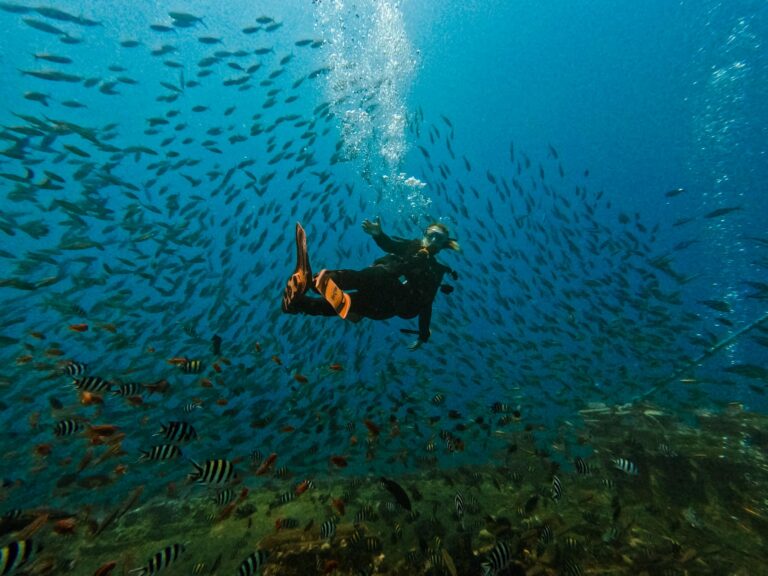
Underwater with thousands of fish
HOW TO CHOOSE A DIVE COMPANY?
When choosing a company to get your Open Water Certification on a budget, there are a few things to consider:
- Check the size of the classes. For the best experience, you want a smaller class size. There were 6 people doing their Open Water Certification alongside the two of us. We split into two groups of 4, each with one instructor and one divemaster. This means we got more individual instruction.
- Inspect the quality of their dive equipment. You don’t want to skimp on safety. It’s alright if it’s not brand new, but you don’t want to see broken equipment or rusting pieces.
- Knowledgeable and experienced instructors. The course should be led by an instructor, not a divemaster (although having both is great!). The instructor should be certified by PADI or SSI.
- Feedback and ratings online. Check TripAdvisor and Google Reviews to get an idea of others’ experiences.
- The dive sites available during the course. Good Open Water courses will choose a variety of locations with different things to see.
- Cost. The cost of the course is important, but check out the cost of local accommodation, amenities, and transport too.
When choosing a budget Open Water certification, remember that ‘cheap’ doesn’t necessarily mean ‘bad quality’. But you want to make sure you’re saving money on the right things, and not compromising on poor instructors or unsafe equipment.
If you are planning on incorporating your dive course next time you travel, I’d also recommend checking if your dive centre includes any meals or accommodation alongside your course. Depending on the destination, this can sometimes bring the overall cost down.
HOW MUCH DID WE SPEND ON OUR OPEN WATER CERTIFICATION?
We did our Open Water Certification in Utila, Honduras, with Captain Morgan’s Dive Centre. This 3-day internationally recognised SSI Open Water Certification included:
- Materials for self-directed study (in the SSI app)
- One classroom session to check our understanding
- Two ‘shallow water’ dives (in water we could stand up in) to get used to the feeling of breathing underwater and practice using all the gear
- Four practice dives (two to 12 metres, two to 18 metres)
- Two free ‘fun dives’ once we were certified
- Four nights accommodation
- Rental equipment
- Internationally recognised SSI Certification
Total cost: $299 USD
TOP TIPS TO KEEP COSTS DOWN WHEN DOING YOUR OPEN WATER CERTIFICATION ON A BUDGET
Although you can’t compromise on the cost of the certification itself, there are plenty of ways to keep other costs down when doing your Open Water Certification on a budget.
Accommodation: Look for a dive school that throws in free accommodation for the duration of your course. Yes, it might be a basic dorm room, but it’s going to save you some precious cash! We were offered beds in a small dorm room (shared bathroom) during our Open Water course, which we gratefully accepted.
Food and drink: Some dive centres throw in a free breakfast before your dives, or a free lunch if you’re out diving all-day. Whilst food isn’t likely too expensive in these budget diving destinations, every little helps.
Socialising: Look out for free events run by the dive centres. There are tons of dive centres in Utila, Honduras, where we learned to dive. Every night one of them ran a social event, inviting divers from the island.
Boat dives VS shore dives: Diving from the shore, where you wade in to the ocean with your gear on, is almost always cheaper than diving from a boat. Keep this in mind when shopping around for a good deal.
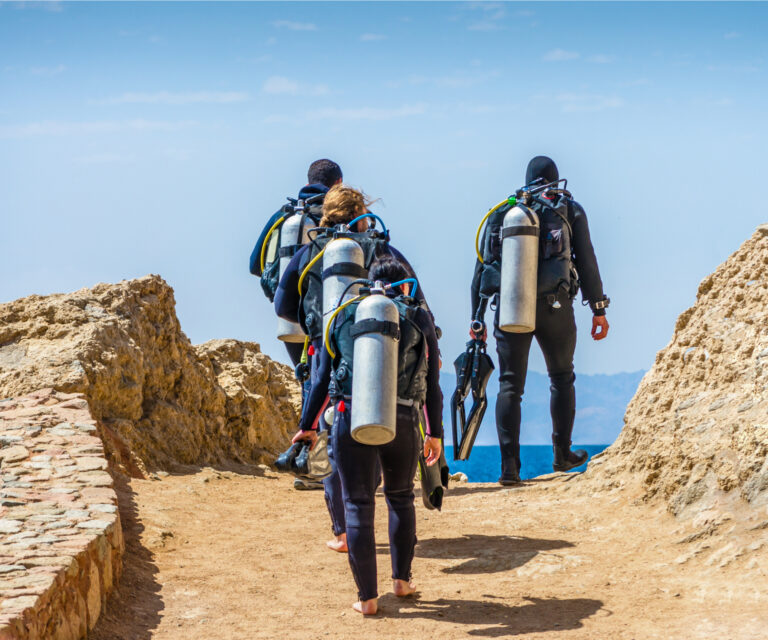
Shore diving in Egypt
HOW TO GET YOUR ADVANCED SCUBA DIVING CERTIFICATION ON A BUDGET?
Once you experience the underwater world, there’s no going back. If you know diving is the hobby for you, like I did, I highly recommend getting your advanced diver certification.
PADI and NAUI call it the Advanced Open Water Diver and SSI calls it Advanced Adventurer, but they’re the same thing.
An advanced scuba course is all about advancing your skills. You’ll get in some more practice at navigation and buoyancy, improve your confidence, try deep diving and sample some of the speciality skills (kind of like a taster course for the speciality courses)
Many of the world’s best dive sites require you to have at least an advanced diving qualification, if not something more specialised. Your advanced certificate and training will open up amazing opportunities, such as:
- Dive anywhere in the world up to 30 metres (100 feet)
- Dive at night and observe all the amazing night wildlife
- Shipwreck dives, like the incredible SS Thistlegorm Wreck
Remember, the more you dive, the more comfortable you become underwater. Getting more practice is never a bad thing, and often, the cost of the advanced course, which includes five dives, is similar to the cost of the same number of ‘fun dives’. If you’re paying anyway, you might as well learn something, right?
DO I NEED AN ADVANCED SCUBA DIVING CERTIFICATION?
Diving is addictive. After learning to dive in Honduras and diving with sharks and manatees in Belize, I was itching to get my advanced certification in Mexico. I got my PADI Advanced Open Water Certificate at Barefoot Divers in Cozumel. And I’m so glad I did it.
Becoming an advanced diver unlocks a lot of cool dive sites. Since then, we’ve dived through shipwrecks in Egypt and between tectonic plates in Iceland. We’ve seen octopuses and sleeping fish at night in Mexico and swam with wild dolphins off the coast of Saudi Arabia.
If you know diving is for you, have a look at doing your Open Water and Advanced certifications together. Most places will offer a discounted rate if you do more than one course with them, so keep this in mind when planning and budgeting.
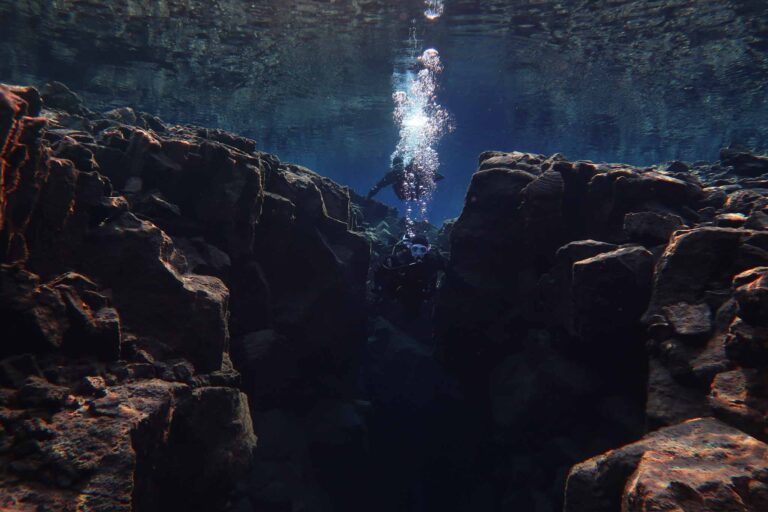
An advanced certification unlocks unique dives, such as Iceland’s Silfra Fissure
WHAT TO BRING ON YOUR DIVES?
Yay, we’ve convinced you to do your open water course! You won’t regret it! We were complete diving novices not so long ago too. If you’re wondering what to bring, here’s what we recommend:
- A swimsuit: That’s it. Something to wear underneath your wetsuit is all you really need to get started. If the ocean is warm, you may even wish to go without a wetsuit (I just wore my swimsuit in Belize). If you forego the wetsuit, bring a t-shirt to stop sunburn, and chafing from your equipment.
- Sunscreen: You’ll be underwater while you’re diving. But between dives, you’ll be hanging out on the boat and probably having a little snack – diving makes me ravenous! You’ll want to protect your skin when you surface, so bring some sunscreen and make sure it’s reef-safe!
You don’t need to bring anything else. Seriously. When you’re getting started, we recommend renting your equipment from the dive centre. Dive gear is expensive, so splurge once you know this is a hobby you’d like to continue.
If you do want to splash out on some gear, here’s what we recommend grabbing first:
- Waterproof Camera. If you like to take photos, I recommend bringing a camera to capture photos all the amazing wildlife you encounter. We brought our GoPro along and ended up splashing out on a special diving case to keep it safe at high pressure.
- Dive computer. Many divers choose to travel with their own dive computer (DC for short). Worn on the wrist, like a smartwatch, a dive computer digitally keeps track of your dive statistics. At a minimum, it logs your maximum depth, time spent underwater, and tells you how long your safety stop needs to be before you surface. Whilst we don’t own a dive computer, this is a small piece of gear that’s easy to travel with, so we see the attraction.
- Dive mask and Fins. Many divers travel with their own dive mask and fins, ensuring a perfect and comfortable fit. They double up for snorkelling too, so we can see why people pack these for a dive trip.
As you may or may not know, we like to pack light, so we usually just rent all our gear as and when we need it. That said, I’m considering splurging on a nice snorkelling mask. I can’t sit still on a beach, so being able to splash about and look for fish and starfish with my own snorkel is probably a good idea for me!
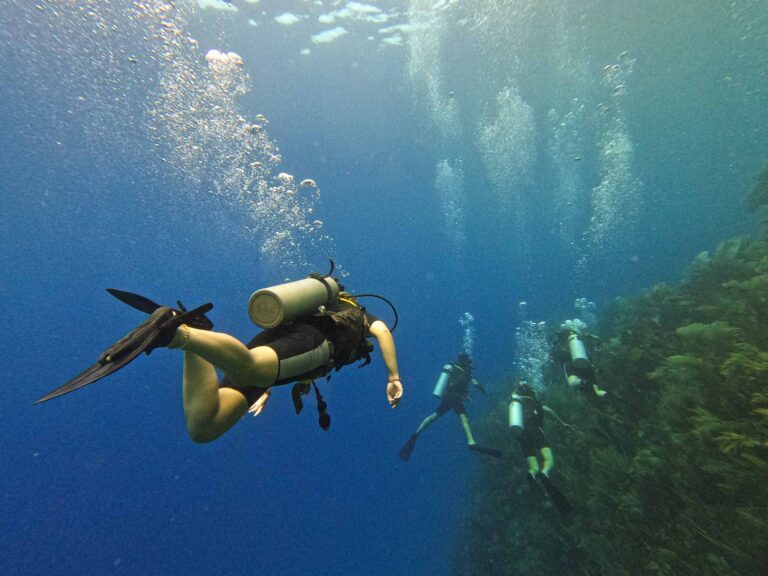
One of my very first dives in Utila
A NOTE ON SUSTAINABLE DIVING
#1 GOOD DIVE PRACTICES
You’ll learn the basics in your Open Water course, but make sure to keep these in mind on every dive. Check your buoyancy before you descend and practice good buoyancy control throughout your dive. This will prevent you from damaging coral reefs and stirring up sediment, which can impact wildlife.
Oh, and if that doesn’t convince you, good buoyancy means that you use your body less to stay afloat. This lowers your air consumption, so you’ll get longer dives from a single tank!
#2 RESPECT & DON'T TOUCH
You should always keep away from any wildlife you encounter in the water – that includes fish, sharks, dolphins, turtles. Never try to touch them, chase them, or ride them (yep… there are people who would try that). Let them approach you if they are curious, but you’ll probably find that they’re not bothered.
Don’t touch the corals either! Corals have delicate structures and can easily break or crumble when touched. Corals also have a protective coating, and the oils and bacteria in your skin can remove this which makes them more vulnerable. Once a coral is damaged, it can take a while to grow back. So best not to touch them at all.
And lastly, help to conserve the biodiversity and beauty of the reef. Don’t litter. Collect any trash that you do see in the water to take back and dispose of. Never collect anything from the reef, such as shells or coral, as a souvenir – there might be an animal inside! As the saying goes, ‘leave only footprints and take only photos’
#3 AVOID WEARING SUNSCREEN
Caring for your skin is important. But if you’re going to go diving, you need to stay clear of the sunscreen or make sure you choose reef-safe sunscreen that’s 100% biodegradable! Coral reefs are dying, species are disappearing at an alarming rate, and while this isn’t entirely down to your choice of sun protection, the chemicals in sunscreen are super hazardous to ocean wildlife. Wear a t-shirt instead!
You shouldn’t use any other oils or lotions either. Scientists say that environmental contaminants in your favourite skincare products can be just as damaging. Save the perfume, moisturiser, make-up and aftersun for after your dive.
#4 CHOOSE SUSTAINABLE DIVE OPERATORS
When choosing a dive company, look for an operator with a clear commitment to protecting the environment. Some dive companies state their policies towards sustainable and eco-friendly diving on their websites. But eco-friendly and sustainable diving could also look like:
- A dive instructor or divemaster who looks out for, and corrects divers who are not practicing good buoyancy
- Dive centres that brief divers on eco-friendly and responsible diving alongside the generic pre-dive brief
- Smaller dive groups, which are easier to monitor
- Dive centres that has environmental practices, such as using resuables instead of single-use plastic between dives and minimising water and electricity consumption
- Enforcing the use of reef-safe sunscreen or providing full-length wetsuits or rash guards as alternative sun protection.
- A company that supports marine conservation and scientific research projects
- The boats you dive from use mooring buoys instead of anchoring on the seabed.
- Employing local people and not relying on international dive instructors
#5 JOIN A REEF CLEANUP
Want to dive for free? Some dive shops around the world organise weekly cleanup dives to remove debris and litter from the ocean. By joining these, the cost of your dive will be reduced, it may even be free, and you’ll be helping to remove trash from the ocean. Talk about a win-win scenario!
If you see any litter in the ocean on any of your dives, please pick this up if it’s safe to do so. You can stash it in the pockets of your BCD to dispose of back on land.
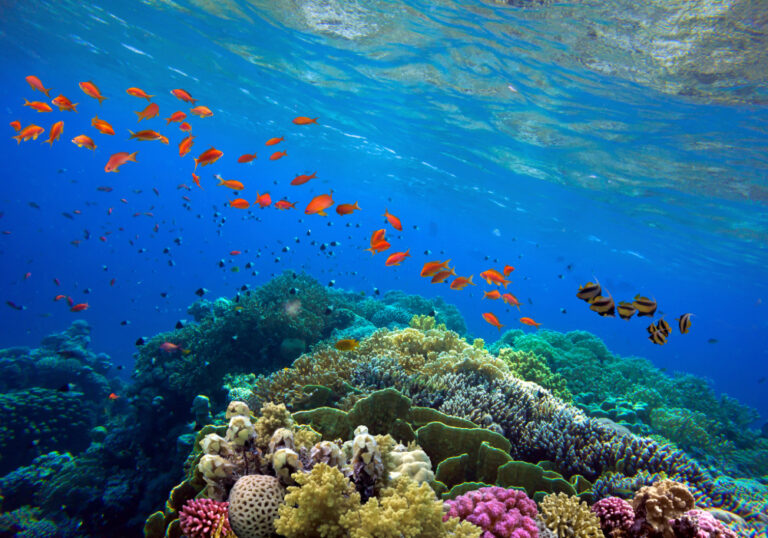
Diving in Utila
FAQs
WHERE IS THE CHEAPEST PADI CERTIFICATION?
The cost of PADI certification can vary significantly depending on the location. Generally, Southeast Asia (e.g., Thailand, Indonesia, the Philippines) tends to offer some of the cheapest options for PADI certification. Countries like Honduras (specifically Utila) and Egypt (Dahab) are also known for affordable diving courses.
HOW DEEP CAN I DIVE WITH OPEN WATER CERTIFICATION?
With a PADI or SSI Open Water Diver certification, you can dive to a maximum depth of 18 meters (60 feet).
HOW MUCH DOES PADI OPEN WATER COST?
The cost of a PADI Open Water course can vary widely depending on the location and the dive shop. On average, you can expect to pay between $300 to $600 USD. This typically includes course materials, equipment rental, and certification fees.
HOW MUCH TO GET PADI CERTIFIED IN THE UK?
In the UK, the cost of a PADI Open Water Diver course generally ranges from £350 to £500. Prices may vary based on the dive center, the specific package, and whether equipment rental is included.
HOW MUCH TO GET PADI CERTIFIED IN THE USA?
In the USA, the cost for a PADI Open Water Diver course typically ranges from $400 to $600. Again, this can vary depending on the location, dive center, and whether equipment rental is included.
HOW LONG DOES IT TAKE TO DO PADI OPEN WATER?
The PADI Open Water Diver course usually takes 3 to 4 days to complete. This includes classroom sessions (or online e-learning), confined water dives (pool sessions), and open water dives.
WHAT TO DO AFTER OPEN WATER CERTIFICATION?
After obtaining your Open Water certification, you can:
- Just have fun! Gain more experience by diving at different sites
- Consider taking the Advanced Open Water Diver course to dive deeper (up to 30 meters/100 feet) and learn new skills.
- Take speciality courses such as underwater photography, wreck diving, or nitrox diving.
DOES OPEN WATER CERTIFICATION EXPIRE?
No, a PADI Open Water Diver certification does not expire. However, if you haven’t been diving for an extended period, it is recommended to take a refresher course, such as the PADI ReActivate program.
IT’S BEEN A WHILE… SHOULD I TAKE MY OPEN WATER COURSE AGAIN?
If it has been a long time since your last dive (typically more than a year), it is advisable to take a refresher course, like the PADI ReActivate program. This will help you review and practice essential diving skills and update your knowledge to ensure you can dive safely. Repeating the entire Open Water course is generally not necessary unless you feel extremely uncomfortable or have forgotten most of the material.
LIKE IT? PIN IT!
SAVE THIS POST TO YOUR PINTEREST BOARD TO COME BACK LATER
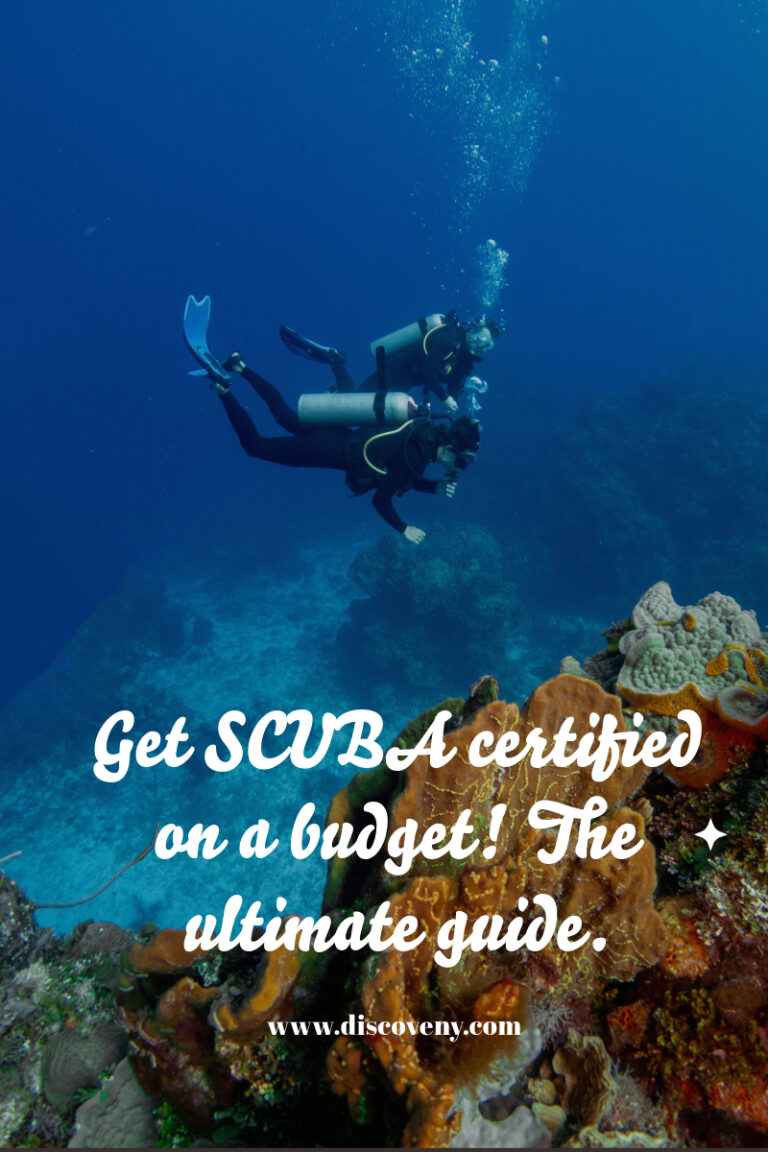
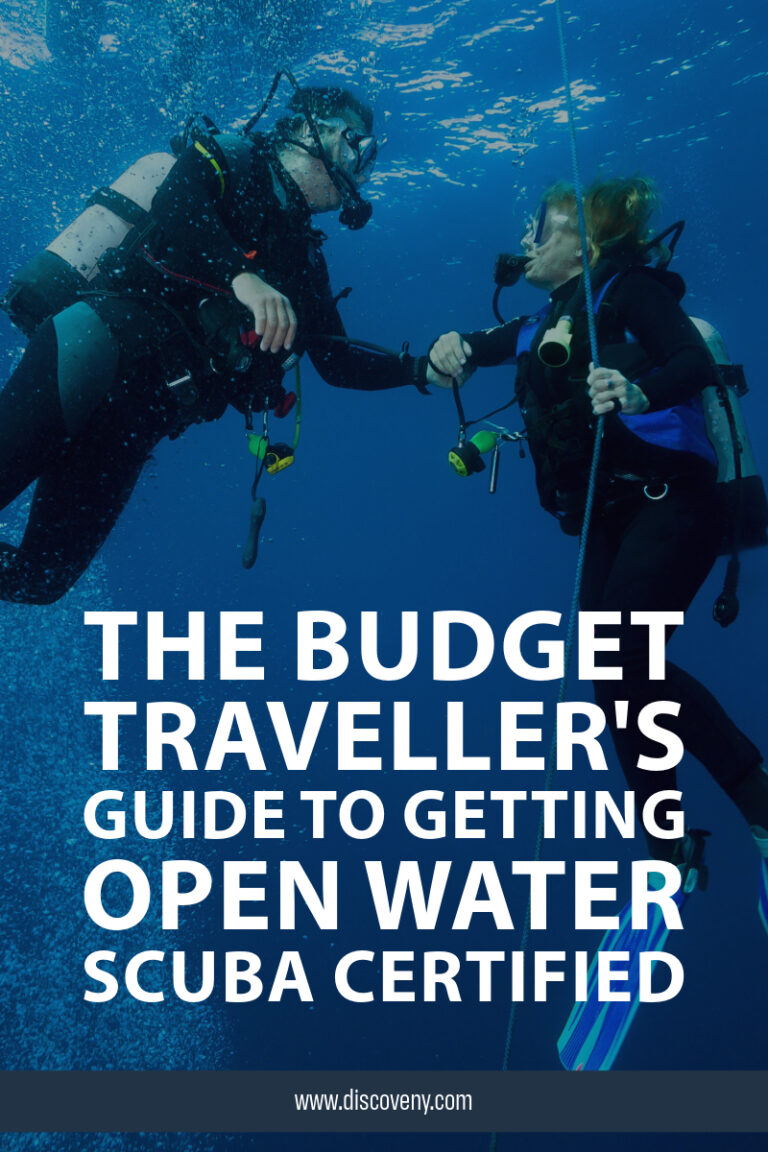
Follow our daily adventures on Facebook and Instagram
Disclaimer: The information and advice provided in this blog are the author’s opinions and based on their personal experiences. All information was accurate at the time of writing. However, things can change quickly, so always double-check current conditions and guidelines before setting out. Remember, your travels and safety are your own responsibility, and this blog can not be held responsible for anything that might happen on your adventures! Always exercise caution and good judgment. Oh, and don’t forget to get travel insurance! Happy travels!
This post may contain affiliate links (yay for transparency!) This means that I will earn a small commission, at no additional cost to you, if you click the link and choose to buy the product. I only link to stuff I have personally bought and found useful and never endorse crap. Your support helps keep the site going, thank you!
Alice
Alice is a UK travel blogger who advocates sustainable travel and being more eco-conscious on a budget. She loves coffee, her houseplants and summiting mountains.
You May Also Like
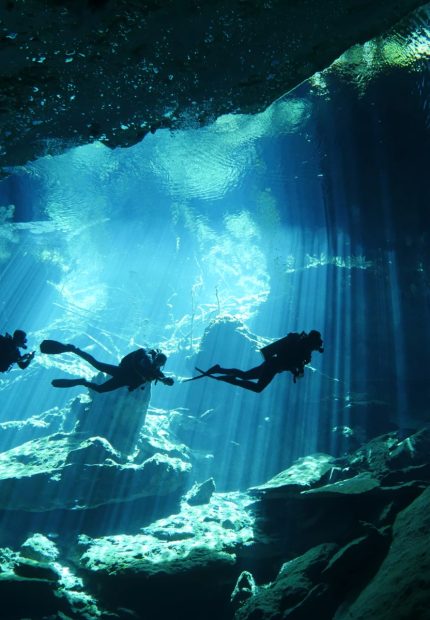
From Mexico to Panama: the ultimate guide to diving in Central America
September 7, 2024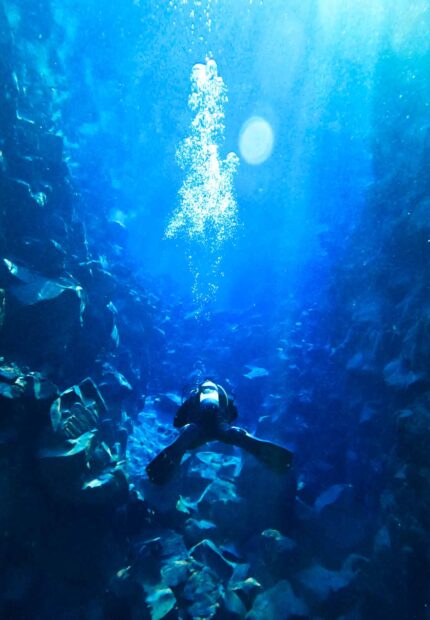
Is Diving in Silfra worth the money? Everything you need to know [2024]
May 18, 2024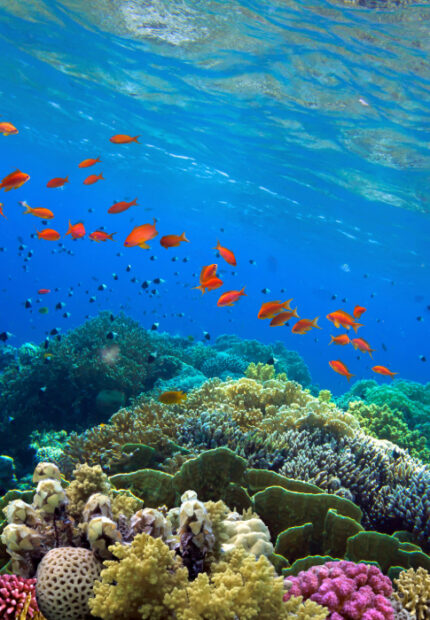
2 Comments
Harriet
Why did you leave NAUI (National Association of Underwater Instructors) out of your list of certifying agencies? They are the oldest certifying agency of the, “Big Three,” NAUI, PADI, and SSI. They are a non-profit, as well. (I’m not affiliated with them in any way.)
Alice
Hey! I’ve never come across NAUI during my travels, only PADI and SSI. I’ll update this post – thanks for letting me know!